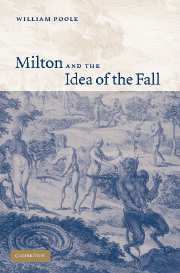Book contents
- Frontmatter
- Contents
- Acknowledgements
- Note on the text
- List of abbreviations
- Introduction
- Part I Fallen culture
- Part II Milton
- 7 Towards Paradise Lost
- 8 Paradise Losti: the causality of primal wickedness
- 9 Paradise Lostii: God, Eden and man
- 10 Paradise Lostiii: creation and education
- 11 Paradise Lostiv: Fall and expulsion
- Conclusion
- Notes
- Index
8 - Paradise Losti: the causality of primal wickedness
Published online by Cambridge University Press: 10 December 2009
- Frontmatter
- Contents
- Acknowledgements
- Note on the text
- List of abbreviations
- Introduction
- Part I Fallen culture
- Part II Milton
- 7 Towards Paradise Lost
- 8 Paradise Losti: the causality of primal wickedness
- 9 Paradise Lostii: God, Eden and man
- 10 Paradise Lostiii: creation and education
- 11 Paradise Lostiv: Fall and expulsion
- Conclusion
- Notes
- Index
Summary
What is the relation of the text of Paradise Lost to the events it describes? When Satan approaches paradise in the poem, he finds the way so knotty and perplexed, that it ‘Access deni'd’ (PL 4.137). What is our access to Paradise Lost, and, in turn, its access to its subject? This is a crucial question, and the appropriate one on which to open a discussion of the epic, because the question of what type of information the epic texture furnishes is at least as important as the ‘information’ itself, which is often thereby revealed to be rather compromised. In Lycidas, for instance, we saw that the final octave acted to disconnect the poem from any simplistic congruence with the events it described. This created a mixture of pastoralism and politics, both operating, but neither cohering to produce merely a stale allegorism.
The octave of Lycidas also effects a temporal dislocation. The poem, which from the front end looks as if it is taking place in the present both in tense and in time (‘I com to pluck’, and in the year 1637), becomes a past activity in the octave: ‘Thus sang the uncouth Swain’, occupant not of the England of the Personal Rule of Charles I, but of a mysterious, distant field, populated only by himself. A similar dislocation happens in Paradise Lost. The epic, like the monody, opens as a present performance, ‘Of Mans First Disobedience … Sing Heav'nly Muse’ (PL 1.1, 6).
- Type
- Chapter
- Information
- Milton and the Idea of the Fall , pp. 146 - 157Publisher: Cambridge University PressPrint publication year: 2005

